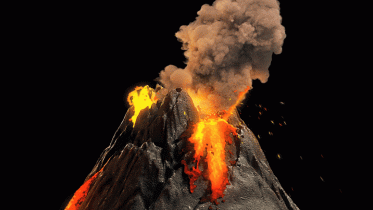
Volcanic Winter
A volcanic winter is a reduction in global temperatures caused by volcanic ash and droplets of sulfuric acid and water obscuring the Sun and raising Earth's albedo after a large, particularly explosive volcanic eruption. Long-term cooling effects are primarily dependent upon injection of sulfur gases into the stratosphere where they undergo a series of reactions to create sulfuric acid which can nucleate and form aerosols. Volcanic stratospheric aerosols cool the surface by reflecting solar radiation and warm the stratosphere by absorbing terrestrial radiation. The variations in atmospheric warming and cooling result in changes in tropospheric and stratospheric circulation.




